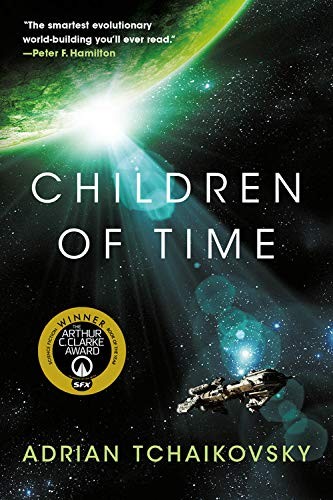enne📚 reviewed Children of Time by Adrian Tchaikovsky (Children of Time, #1)
Children of Time
4 stars
This feels like the most "classic scifi" book that I have read in a long time. Spaceships! Evolution! Cold sleep! Ark ships from a ruined earth! Aliens! Consciousness upload! Space battles! I'm half-joking here, but rather than trite, it felt refreshing to read this more classic space opera story as a change of pace from my usual fare.
The story is told through two parallel perspectives, one following the historian Holsten Mason (a classicist of now-gone earth empires) on an ark ship and another following the historical development and intelligent evolution of spiders on a terraformed planet. Both perspectives are told over great swaths of time: pictures of important moments in spider history as they evolve, but also flashes of human experience as well between cold sleep as they try to survive with what's left of humanity. If anything, despite following the same major characters, the human narrative is just as disjoint as the spider historical one, as Holsten is continually woken up briefly to be forced into some (terrible) surprising development and then put back into cold sleep for years immediately after, in a psychologically devastating cycle.
The immediate comparison for me, especially one about intelligent spiders, is to think about Vernor Vinge's A Deepness in the Sky. One thing I think Children of Time does very well is to consider what a spider psychology would be like, in terms of gender politics, social groups, communication, decision-making, conflict, etc. Spider technology develops in its own branching way and not along human paths or with human priorities. Having a picture of society throughout history as well helps to build this evolutionary social picture. A Deepness in the Sky's spiders in comparison felt ...much too human, in a lot of ways. In some ways, the storytelling there was at a disadvantage because the spider's perspective was mediated by Focused humans translating spider experiences into a more human one. However, I don't feel like the spider-ness came through as it did so strongly in this book.
(One small aside observation, is that I felt like the spider's Understandings and ways of knowing and remembering things about the world felt in some ways like a parallel to current day searchable internet knowledge. When information is easily accessible, it's no longer interesting or novel to just be able to know things, but more about being able to interconnect information from different disciplines or to learn knew things. On a related note, I would LOVE to hear about spider Understanding librarians. How do they organize this information and distribute it??)
In some ways, this is a reversal of a typical "uplift" narrative, where humans uplift some animals, but there's always a power dynamic of human superiority the whole time. One of the things that changes this dynamic in this book is that there's a reversal of humanity's fortunes very early on in the book. Things go very poorly on the human end of things: failing technology, no planets to settle on, intergroup squabbling, revolts, colonial attitudes, attempting genocide. The spider end of the story is generally one of social and technological growth, the successful overcoming of obstacles, and "humanization" to put it in a particular way. By the end, for me, it felt like it was intended for the reader to empathize more with the spiders than (most of) the humans, and I think this narrative framing makes the ending very satisfying.
One small quibble on my part (and this appears to continue into other books [not that I'm hypothetically halfway through book two right now]), is that I found it weird that all of the spiders retained the same names (Portia, Bianca, Fabian, and Viola) throughout each of the different perspectives throughout all of history, despite being different individuals in each story. In some ways, I can understand the parallel of telling one story of humans (the same ones, pulled across time via cold sleep) and one story of spiders (the same names, by convention). However, these spiders were not just archetypes and were different enough from each other, that I felt like it stripped some of their individuality, especially in comparison to the human side of the story.
I enjoyed this book a bunch and will read (am already reading) the sequels.

